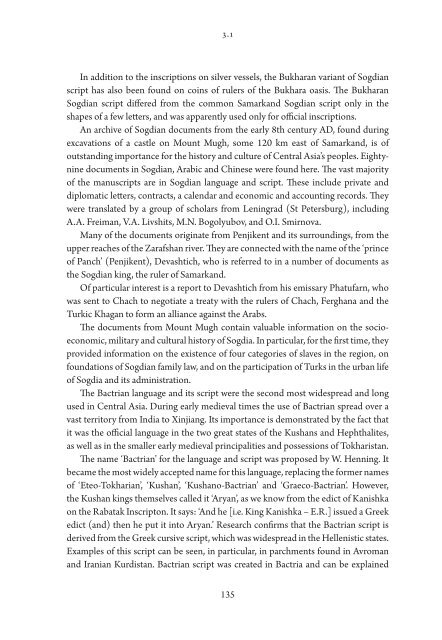Create successful ePaper yourself
Turn your PDF publications into a flip-book with our unique Google optimized e-Paper software.
3.1<br />
In addition to the inscriptions on silver vessels, the Bukharan variant <strong>of</strong> Sogdian<br />
script has also been found on coins <strong>of</strong> rulers <strong>of</strong> the Bukhara oasis. The Bukharan<br />
Sogdian script differed from the common Samarkand Sogdian script only in the<br />
shapes <strong>of</strong> a few letters, and was apparently used only for <strong>of</strong>ficial inscriptions.<br />
An archive <strong>of</strong> Sogdian documents from the early 8th century AD, found during<br />
excavations <strong>of</strong> a castle on Mount Mugh, some 120 km east <strong>of</strong> Samarkand, is <strong>of</strong><br />
outstanding importance for the history and culture <strong>of</strong> Central <strong>Asia</strong>’s peoples. Eightynine<br />
documents in Sogdian, Arabic and Chinese were found here. The vast majority<br />
<strong>of</strong> the manuscripts are in Sogdian language and script. These include private and<br />
diplomatic letters, contracts, a calendar and economic and accounting records. They<br />
were translated by a group <strong>of</strong> scholars from Leningrad (St Petersburg), including<br />
A.A. Freiman, V.A. Livshits, M.N. Bogolyubov, and O.I. Smirnova.<br />
Many <strong>of</strong> the documents originate from Penjikent and its surroundings, from the<br />
upper reaches <strong>of</strong> the Zarafshan river. They are connected with the name <strong>of</strong> the ‘prince<br />
<strong>of</strong> Panch’ (Penjikent), Devashtich, who is referred to in a number <strong>of</strong> documents as<br />
the Sogdian king, the ruler <strong>of</strong> Samarkand.<br />
Of particular interest is a report to Devashtich from his emissary Phatufarn, who<br />
was sent to Chach to negotiate a treaty with the rulers <strong>of</strong> Chach, Ferghana and the<br />
Turkic Khagan to form an alliance against the Arabs.<br />
The documents from Mount Mugh contain valuable information on the socioeconomic,<br />
military and cultural history <strong>of</strong> Sogdia. In particular, for the first time, they<br />
provided information on the existence <strong>of</strong> four categories <strong>of</strong> slaves in the region, on<br />
foundations <strong>of</strong> Sogdian family law, and on the participation <strong>of</strong> Turks in the urban life<br />
<strong>of</strong> Sogdia and its administration.<br />
The Bactrian language and its script were the second most widespread and long<br />
used in Central <strong>Asia</strong>. During early medieval times the use <strong>of</strong> Bactrian spread over a<br />
vast territory from India to Xinjiang. Its importance is demonstrated by the fact that<br />
it was the <strong>of</strong>ficial language in the two great states <strong>of</strong> the Kushans and Hephthalites,<br />
as well as in the smaller early medieval principalities and possessions <strong>of</strong> Tokharistan.<br />
The name ‘Bactrian’ for the language and script was proposed by W. Henning. It<br />
became the most widely accepted name for this language, replacing the former names<br />
<strong>of</strong> ‘Eteo-Tokharian’, ‘Kushan’, ‘Kushano-Bactrian’ and ‘Graeco-Bactrian’. However,<br />
the Kushan kings themselves called it ‘Aryan’, as we know from the edict <strong>of</strong> Kanishka<br />
on the Rabatak Inscripton. It says: ‘And he [i.e. King Kanishka – E.R.] issued a Greek<br />
edict (and) then he put it into Aryan.’ Research confirms that the Bactrian script is<br />
derived from the Greek cursive script, which was widespread in the Hellenistic states.<br />
Examples <strong>of</strong> this script can be seen, in particular, in parchments found in Avroman<br />
and Iranian Kurdistan. Bactrian script was created in Bactria and can be explained<br />
135


